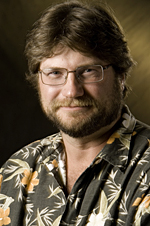
Geology Prof Michael Petronis Presents Arctic Research March 2
Highlands University environmental geology professor Michael Petronis will present a talk, ‘Glacial Activity in Neoproterozoic Svalbard,’ March 2 at 12 p.m. as part of a Sigma XI lecture series.
The talk will be in G35, the Leveo Sanchez Lecture Hall on the ground floor of Donnelly Library. It is sponsored by the university’s chapter of Sigma Xi, a scientific research society.
Light refreshments will be served.
Petronis was part of a jointscientific research expedition to the Arctic Circle in summer 2010 to study the Snowball Earth Hypothesis.
The research field camp was on the island of Spitsbergen in the Svalbard region of Norway, an archipelago of islands north of mainland Norway approximately 65 miles from the North Pole.
Svalbard glacigenic sediments are among the best preserved in the world. The sediments are from the Neoproterozoic Era, a unit of geological time famous for its ice ages.
“The Snowball Earth Hypothesis describes a time period when glaciers covered the entire planet from pole to pole multiple times during the Neoproterozoic Era approximately 750 million years ago,” Petronis said. “The hypothesis remains contentious and is argued in the geologic literature. This new fundamental research provides additional data to test various hypotheses.”
Petronis drilled sedimentary rock samples in Svalbard using a modified chain saw with a diamond-tipped rock coring drill.
“The importance of this geological research is that the rocks we are studying preserve a record of dramatic, rapid climate shifts, which caused a reverse greenhouse effect, meaning the Earth and its oceans froze,” Petronis said.
Petronis brought the rock samples back for analysis in the Highlands University paleomagnetic laboratory. The lab was funded through a grant Petronis and fellow geology professor Jennifer Lindline secured from the National Science Foundation in 2008.
Instruments in the paleomagnetic lab are used for studying magnetic properties of rocks and other Earth materials. Petronis said Highlands University geology students have opportunities to conduct lab research related to the Snowball Earth study.
The 2010 Arctic research team was led by scientists from the United Kingdom, including one Petronis collaborated with on past joint geology research projects.
Petronis helped write the grant proposal for the Snowball Earth research initiative, which was funded by a $1.2 million grant from the United Kingdom’s National Environmental Research Council (NERC).
